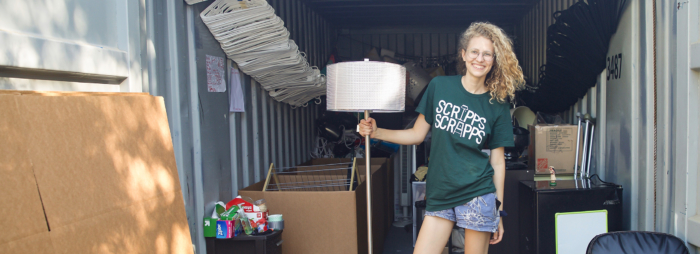
As stores around the country advertise back-to-college shopping events, Scripps students know that the best deals are to be found right on campus.
Now in its second year, the annual “Scripps Scrapps” event (think: campus-wide yard sale) boasts goods for students to outfit their residence halls and themselves. The shop opens for first-year students on Wednesday, August 28, at 8:00 a.m., with the rest of the student community invited to shop on Sunday, September 1, from 9:00 a.m until noon.
“First-year students, especially, spend so much money on hangers, storage drawers, and décor, buying things that we have at Scripps Scrapps for a fraction of the price,” says Anne Shalamoff ’20, an environmental analysis major who has been working for the initiative since her sophomore year.
Scripps Scrapps gets its inventory after finals week the previous spring, when students start clearing out the residence halls to return home. What they leave behind—everything from furniture to twinkle lights to clothes to mini refrigerators—could fill a department store. A dedicated group of student workers, whose wages are paid by the previous years’ profits, reclaims salvageable items that will be stored over the summer and sold at the start of the fall semester.
During its pilot year, the program estimates that the sale diverted three and a half to four tons of consumer goods from landfills. Items not sold are donated to Goodwill, Crossroads (which provide housing, education, support, counseling, and employment training for women who have been incarcerated), and House of Ruth (which provides support services to victims of domestic violence).
Scripps Scrapps is one of several sustainability initiatives happening on the Scripps campus, including the recently implemented food waste program in the dining hall as well as the ongoing revitalization of the Browning garden.
“I came to a liberal arts college to study environmental analysis because of its interdisciplinary approach—I get to learn about the environment from the perspectives of science, history, politics, and economics,” says Shalamoff. “Scripps Scrapps is just another way to think about how we consume and reuse goods and then make a change for the better.”

